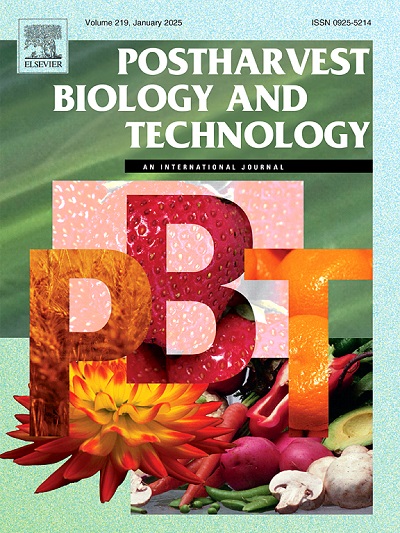Multiple genetic analyses disclose the QTL dynamic for fruit texture and storability in Norwegian apples (Malus domestica Borkh.)
IF 6.4
1区 农林科学
Q1 AGRONOMY
引用次数: 0
Abstract
In Norway, apples (Malus domestica Borkh.) are produced at latitude around 60° north. Notably the season is short and cool and Norwegian cultivars have developed under selection pressure from these distinct climatic conditions, resulting in apple germplasm with unique genetic structure and pedigree. Strong selection for earliness has resulted in several cultivars that mature and soften quickly, making it challenging to meet consumer expectations for apple quality. The commercial success of apple is largely related to its texture and long-term storability, enabling a year-round availability of fresh fruit. Texture in apple has been well characterized and major causative genes have been found. Nonetheless, comprehensive knowledge of the genetic control of texture retention is lacking. To improve postharvest performance, including storability, in the breeding program currently ongoing at Njøs Fruit and Berry Centre (NJØS), a diversity collection of 197 apple cultivars was employed to initiate a genome-wide association analysis (GWAS) to identify relevant genomic regions associated with these aspects. Quantitative trait loci (QTL) associated with different dissected multi-trait texture components assessed by a texture analyzer equipped with an acoustic device were identified. To target QTLs relevant to improving postharvest storage, a softening and storage index was also implemented into the QTL analysis, further mapped on chromosome 10. The GWAS-QTL pattern was additionally validated on a different genetic background, implementing a multi-parental-cross-design scheme. Findings include previously unreported genomic regions related to texture attributes, and especially haploblock HB-10–03 represents an important novel molecular tool valuable for breeding Norwegian apple cultivars with superior fruit storability.
多重遗传分析揭示了挪威苹果(Malus domestica Borkh.)果实质地和贮藏性的 QTL 动态特征
挪威的苹果(Malus domestica Borkh.)产于北纬60°左右的地区。挪威的栽培品种是在这些独特气候条件的选择压力下培育出来的,因此其苹果种质具有独特的遗传结构和血统。对早熟性的强烈选择导致一些栽培品种迅速成熟和软化,从而使满足消费者对苹果质量的期望面临挑战。苹果在商业上的成功在很大程度上与其质地和长期贮藏性有关,这使得新鲜水果可以全年供应。苹果质地的特征已得到很好的描述,主要的致病基因也已找到。然而,对质地保持的遗传控制还缺乏全面的了解。为了在目前正在恩约斯水果和浆果中心(NJØS)进行的育种计划中改善包括耐贮性在内的采后性能,我们利用 197 个苹果栽培品种的多样性收集启动了全基因组关联分析(GWAS),以确定与这些方面相关的基因组区域。通过配备声学装置的质地分析仪评估不同的剖分多性状质地成分,确定了与之相关的数量性状位点(QTL)。为了锁定与改善采后贮藏相关的 QTL,还在 QTL 分析中加入了软化和贮藏指数,并进一步映射到 10 号染色体上。此外,还通过多亲本杂交设计方案,在不同的遗传背景上验证了 GWAS-QTL 模式。研究结果包括以前未报道过的与质地属性有关的基因组区域,特别是单倍组块HB-10-03代表了一种重要的新型分子工具,对培育具有优良果实贮藏性的挪威苹果栽培品种很有价值。
本文章由计算机程序翻译,如有差异,请以英文原文为准。
求助全文
约1分钟内获得全文
求助全文
来源期刊

Postharvest Biology and Technology
农林科学-农艺学
CiteScore
12.00
自引率
11.40%
发文量
309
审稿时长
38 days
期刊介绍:
The journal is devoted exclusively to the publication of original papers, review articles and frontiers articles on biological and technological postharvest research. This includes the areas of postharvest storage, treatments and underpinning mechanisms, quality evaluation, packaging, handling and distribution of fresh horticultural crops including fruit, vegetables, flowers and nuts, but excluding grains, seeds and forages.
Papers reporting novel insights from fundamental and interdisciplinary research will be particularly encouraged. These disciplines include systems biology, bioinformatics, entomology, plant physiology, plant pathology, (bio)chemistry, engineering, modelling, and technologies for nondestructive testing.
Manuscripts on fresh food crops that will be further processed after postharvest storage, or on food processes beyond refrigeration, packaging and minimal processing will not be considered.
 求助内容:
求助内容: 应助结果提醒方式:
应助结果提醒方式:


